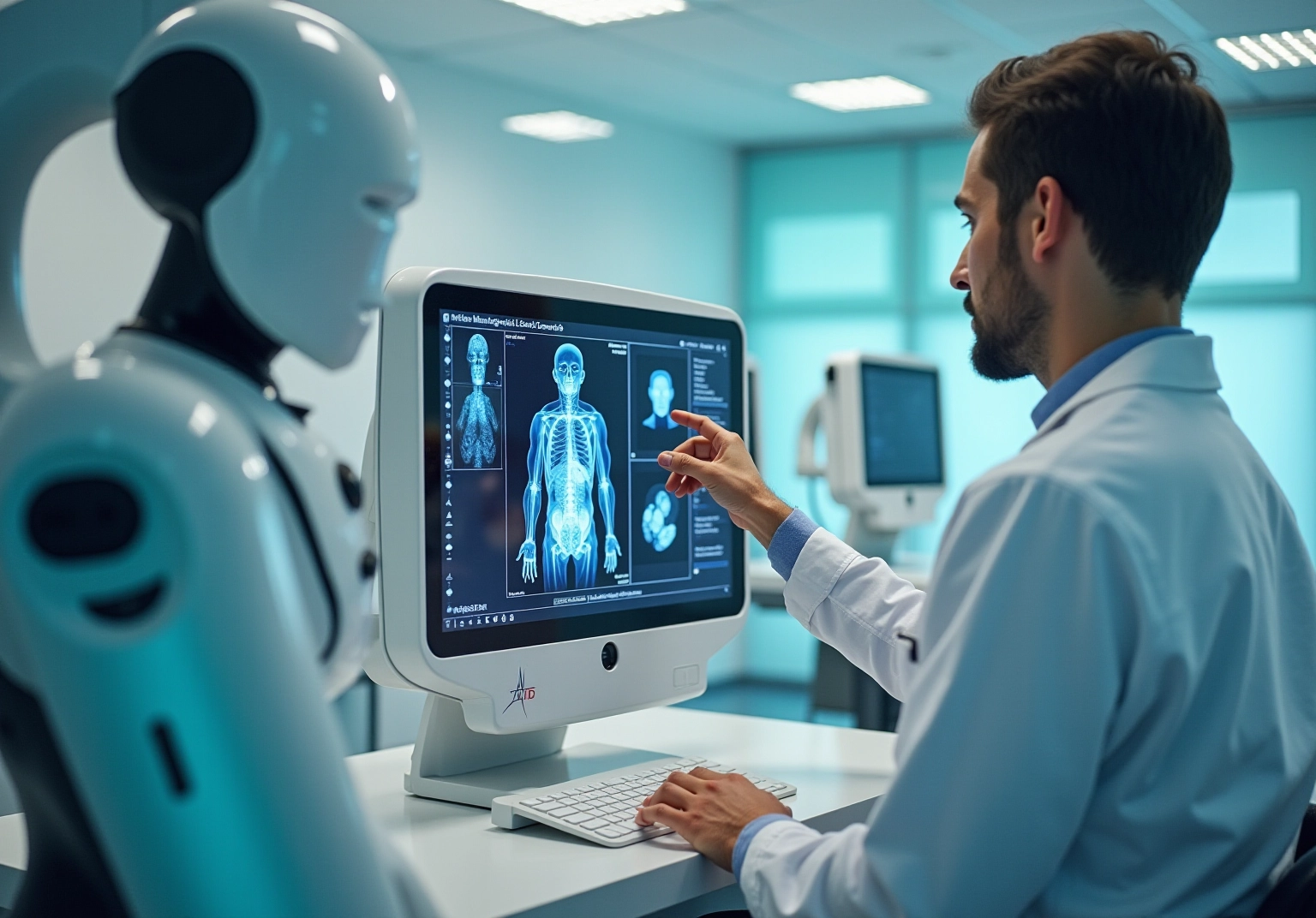
The article explores the applications of AI in healthcare, highlighting its transformative impact on:
It emphasizes that while AI enhances patient outcomes and operational workflows, challenges such as:
must be addressed to fully realize its potential in the medical field.
Artificial intelligence is fundamentally transforming the healthcare landscape, presenting innovative solutions that significantly enhance efficiency and improve patient outcomes. With applications that span advanced diagnostic tools and predictive analytics, AI transcends being merely a technological trend; it signifies a profound shift in the approach medical professionals take toward patient care. However, as the integration of AI technologies accelerates, critical challenges arise, including privacy concerns and regulatory compliance. This prompts a pressing question: how can the healthcare industry effectively harness the power of AI while ensuring ethical standards and equitable treatment for all patients?
Artificial Intelligence (AI) in medicine signifies a transformative approach, leveraging advanced algorithms and software to emulate human cognition in the analysis, interpretation, and management of medical information. This encompasses machine learning, natural language processing, and robotics, empowering systems to learn from data, discern patterns, and make informed decisions.
The applications of AI in healthcare include:
Notably, 40% of medical providers have reported improved efficiency due to AI solutions in the sector, underscoring its substantial impact on operational workflows. The integration of AI aims to enhance efficiency, precision, and outcomes for patients while reducing administrative burdens on service providers.
Effective implementations, such as the HCC Assistant by Inferscience, exemplify how AI can alleviate these challenges, improve coding accuracy, and optimize funding from Medicare Advantage recipients. As medical organizations progressively embrace the applications of AI in healthcare, they are poised to realize significant advancements in efficiency and patient engagement, paving the way for a more effective service delivery system.
However, challenges such as privacy concerns and the necessity for regulatory compliance remain critical considerations in the adoption of AI technologies.

The evolution of applications of AI in healthcare commenced in the 1960s, marked by early efforts in computer-assisted diagnosis. Over the decades, advancements in computing power and data availability have catalyzed significant breakthroughs. Notably, the 1970s saw the introduction of MYCIN, one of the first expert systems designed to diagnose bacterial infections, exemplifying the applications of AI in healthcare and showcasing its potential in medical decision-making. The 1980s heralded the emergence of specialized tools that facilitated rule-based decision-making in clinical settings, establishing a foundation for more sophisticated applications. By the 2000s, the advent of machine learning revolutionized the landscape, empowering systems to learn from extensive datasets and enhance their predictive capabilities. For example, machine learning models have accelerated drug discovery by predicting molecule effectiveness, illustrating AI’s impact on research and development within the medical domain.
Recent advancements have further solidified AI’s role in medical services, with deep learning techniques now enabling complex analyses of medical images and the prediction of individual outcomes. AI algorithms have markedly improved the detection of diseases such as cancer, proving their superiority over traditional diagnostic methods. The integration of AI into healthcare has also led to personalized treatment plans, showcasing the applications of AI in healthcare by tailoring interventions based on individual data. Moreover, AI contributes to reducing missed appointments by improving engagement through enhanced communication, demonstrating its tangible impact on medical service delivery.
Looking ahead, the rapid proliferation of AI technologies is projected to continue, with forecasts indicating a compound annual growth rate of 40% in the medical sector by 2021. By 2025, widespread adoption of AI across medical systems is anticipated, fundamentally transforming care delivery and improving outcomes for patients. As experts assert, “AI functions optimally as a device that automates standard jobs,” allowing medical professionals to focus more on patient care while automating routine tasks. This evolution underscores the critical role that applications of AI in healthcare will play in shaping the future, while also highlighting the importance of addressing ethical concerns related to patient privacy and data security.
Key applications of AI in healthcare encompass several critical areas:
Diagnostic Imaging: AI algorithms excel in analyzing medical images, achieving diagnostic accuracy rates that often surpass those of human radiologists. For instance, AI systems have demonstrated a remarkable 94% accuracy in detecting lung nodules, significantly outperforming the 65% accuracy of radiologists in similar tasks. Additionally, the specificity of AI-based imaging for lung cancer screening is 93.6%, enhancing early detection of conditions like lung cancer and reducing false positives. This capability minimizes unnecessary procedures, thereby improving patient outcomes.
Predictive Analytics: AI tools utilize extensive volumes of individual data to forecast health outcomes, enabling proactive interventions. Predictive models have demonstrated a 32% enhancement in the early identification of ventricular dysfunction compared to standard care, allowing providers to recognize at-risk individuals and apply focused follow-up treatment. This proactive approach is essential in lowering readmission rates and enhancing overall health outcomes.
Clinical Decision Support: AI technologies offer medical practitioners evidence-based suggestions, improving decision-making processes. These systems can notify providers of possible drug interactions and recommend treatment options customized to individual health histories, thereby enhancing the quality of care provided.
Administrative Automation: AI significantly streamlines administrative tasks such as coding and billing, which reduces errors and allows staff to concentrate more on patient care. Inferscience’s HCC Assistant exemplifies this by automating HCC coding processes, enhancing accuracy and improving efficiency in managing medical operations. This incorporation of AI into administrative workflows is essential for maximizing funding from Medicare Advantage contracts and easing the administrative burdens encountered by medical providers. Additionally, the economic effect of the applications of AI in healthcare, particularly in imaging, is considerable, with an estimated potential savings of $3.7 billion each year for the US medical system.
While the applications of AI in healthcare hold significant promise for transforming the industry, several challenges impede their broader adoption. Key considerations include:
Information Privacy and Security: The use of sensitive individual information raises significant concerns regarding privacy violations and information security. Healthcare organizations must adhere to stringent regulations, such as HIPAA, to safeguard patient information and maintain trust.
Bias and Fairness: AI systems can unintentionally perpetuate biases embedded in their training data, resulting in unequal treatment outcomes. Research indicates that 39% of English-speaking Asian adults and 64% of Black adults view discrimination based on race or ethnicity as a significant problem in medical services. Addressing these biases is crucial for ensuring fair medical service delivery. Innovative training techniques, such as transfer learning, are being explored to mitigate these discrepancies. Furthermore, a technology firm recently ceased using a hiring algorithm after finding it disadvantaged candidates from women’s colleges, demonstrating the real-world consequences of bias in AI. Interestingly, around half (51%) of those who recognize an issue believe that the increased applications of AI in healthcare could assist in diminishing bias and unjust treatment.
Integration with Existing Systems: The successful implementation of AI solutions necessitates seamless integration with current medical IT systems, a process that can be both complex and costly. Organizations must navigate these challenges to fully leverage AI’s capabilities.
Regulatory Compliance: The regulatory landscape for AI technologies is still evolving, making it challenging for medical providers to stay informed about compliance requirements. Adhering to these guidelines is essential to avoid potential penalties and ensure the ethical use of AI. Public concerns are evident, with 32% of US adults believing AI could lead to worse pain treatment management, highlighting the need for careful implementation of AI technologies.
Workforce Training: Sufficient instruction for medical personnel on AI tools is essential for successful implementation. Organizations must invest in comprehensive training programs to maximize the applications of AI in healthcare and enhance workforce readiness. The mixed feelings among the public regarding AI’s role in healthcare, as illustrated in the case study “Public Perception of AI in Healthcare,” underscore the importance of education on AI technologies.
As industry leaders emphasize, transparency and accountability in AI deployment are paramount to building trust and ensuring that these technologies enhance patient care rather than exacerbate existing disparities.

The exploration of AI in healthcare signifies a transformative shift in the processing and utilization of medical information. By harnessing advanced algorithms, AI enhances diagnostic accuracy and operational efficiency, paving the way for personalized patient care. This integration marks a pivotal moment in healthcare delivery, where technology and human expertise converge to improve outcomes and streamline processes.
Key applications of AI have been highlighted, including:
Each of these areas showcases AI’s potential to improve accuracy and patient engagement while alleviating the administrative burdens that often hinder healthcare providers. However, despite these impressive advancements, challenges such as privacy concerns, bias in AI systems, and the necessity for regulatory compliance remain critical hurdles that must be addressed to ensure ethical and effective implementation.
Looking forward, the continued evolution of AI technologies holds immense promise for the future of healthcare. Emphasizing the importance of transparency and accountability in AI deployment will be essential in building trust among patients and providers alike. As the healthcare landscape evolves, embracing these innovations while addressing ethical considerations will be crucial in realizing AI’s full potential to enhance patient care and improve health outcomes. The call to action is clear: stakeholders must collaborate to navigate these challenges and harness the power of AI, ensuring that its benefits are accessible to all within the healthcare ecosystem.